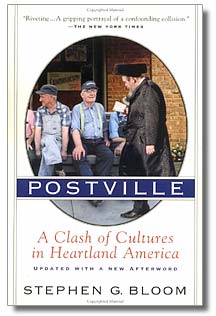
Postville is a city in Allamakee and Clayton counties in the U.S. state of Iowa. It lies near the junction of four counties and at the intersection of U.S. Routes 18 and 52 and Iowa Highway 51, with airport facilities in the neighboring communities of Waukon, Decorah, Monona and Prairie du Chien. The population was 2,227 at the 2010 census, down from 2,273 in 2000. The city is located in the southwestern corner of Allamakee County and the northwestern corner of Clayton County in a quad county, or four corner region, where four counties intersect in the same spot. Winneshiek County is just to the west, and Fayette County is located just to the southwest of Postville.

Chabad, also known as Lubavitch, Habad and Chabad-Lubavitch, is an Orthodox Jewish Hasidic movement. Chabad is one of the world's best-known Hasidic movements, particularly for its outreach activities. It is one of the largest Hasidic groups and Jewish religious organizations in the world.
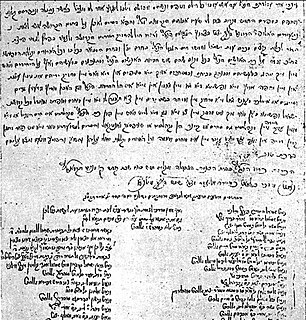
Misnagdim were the current among the Jews of Eastern Europe which resisted the rise of Hasidism in the 18th and 19th centuries. The Misnagdim were particularly concentrated in Lithuania, where Vilnius served as the bastion of the movement, but anti-Hasidic activity was undertaken by the establishment in many locales. The most severe clashes between the factions took place in the latter third of the 18th century; the failure to contain Hasidism led the Misnagdim to develop distinct religious philosophies and communal institutions, which were not merely a perpetuation of the old status quo but often innovative. The most notable results of these efforts, pioneered by Chaim of Volozhin and continued by his disciples, were the modern, independent yeshiva and the Musar movement. Since the late 19th century, tensions with the Hasidim largely subsided, and the heirs of Misnagdim adopted the epithet "Litvaks".

In Judaism, shechita is slaughtering of certain mammals and birds for food according to kashrut.
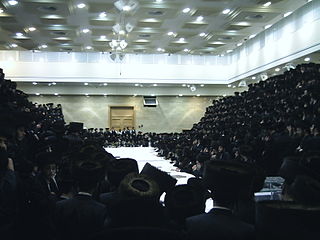
A tish is a gathering of Hasidim around their Rebbe. In Hebrew, a tish is called hitveadut. It may consist of speeches on Torah subjects, singing of melodies known as niggunim and zemirot ("hymns"), with refreshments being served. Hasidim see it as a moment of great holiness. They are public events that are open to non-Hasidim as well.

The legal aspects of ritual slaughter include the regulation of slaughterhouses, butchers, and religious personnel involved with traditional shechita (Jewish) and dhabiha (Islamic). Regulations also may extend to butchery products sold in accordance with kashrut and halal religious law. Governments regulate ritual slaughter, primarily through legislation and administrative law. In addition, compliance with oversight of ritual slaughter is monitored by governmental agencies and, on occasion, contested in litigation.
Chaim Yisroel Belsky was an American rabbi and posek of Orthodox Judaism and Haredi Judaism who resided in Brooklyn, New York. He was one of the roshei yeshiva at Yeshiva Torah Vodaas, and rabbi of the summer camp network run by Agudath Israel of America.
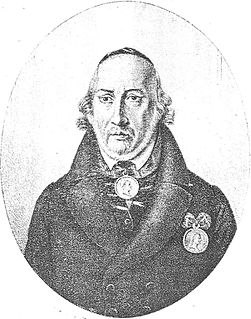
Joseph Perl, was an Ashkenazi Jewish educator and writer, a scion of the Haskalah or Jewish Enlightenment. He wrote in Hebrew, Yiddish, and German; in 1819, he published the first Hebrew novel. Born and raised in the Austrian province of Galicia shortly after its annexation in the first partition of Poland, he was a follower of Hasidism in his youth. Later, he turned against Hasidism and became a proponent of Jewish emancipation and Haskalah, although he remained an observant Jew. He is best known for his many writings on Hasidism, ranging from critical treatises to parody.
Abraham Aaron Rubashkin was an Russian-American businessman. He died during the COVID-19 pandemic due to complications brought on by COVID-19.

Sholom Mordechai Rubashkin is an American businessman and the former CEO of Agriprocessors, a now-bankrupt kosher slaughterhouse and meat packing plant in Postville, Iowa, formerly owned by his father, Aaron Rubashkin. During his time as CEO of the plant, Agriprocessors grew into the largest kosher meat producer in the United States, but was also cited for issues involving animal treatment, food safety, environmental safety, child labor, and hiring of undocumented immigrants.
Stephen G. Bloom is an American journalist and professor of Journalism at the University of Iowa, in Iowa City.
Magen Tzedek, originally known as Hekhsher Tzedek, is a complementary certification for kosher food produced in the United States in a way that meets Jewish Halakhic (legal) standards for workers, consumers, animals, and the environment, as understood by Conservative Judaism. Magen Tzedek certification is not a kashrut certification which certifies that food is kosher in that it meets certain requirements regarding ingredients of food and technical methods of animal slaughter, but an ethical certification complementary to conventional kosher certification.

Agriprocessors was the corporate identity of a slaughterhouse and meat-packaging factory based in Postville, Iowa, best known as a facility for the glatt kosher processing of cattle, as well as chicken, turkey, duck, and lamb. Agriprocessors' meat and poultry products were marketed under the brand Iowa Best Beef. Its kosher products were marketed under various labels, including Aaron’s Best, Shor Habor, Supreme Kosher, and Rubashkins.

The Postville raid was a raid at the Agriprocessors, Inc. kosher slaughterhouse and meat packing plant in Postville, Iowa, on May 12, 2008, executed by the U.S. Immigration and Customs Enforcement (ICE) division of the Department of Homeland Security together with other agencies, the largest single raid of a workplace in U.S. history until then.
KPVL is a non-commercial community radio station licensed to Postville, Iowa, United States. The station is currently owned by Community Public Media and managed by Radio Postville, Inc.
The Tav HaYosher is a certification mark offered, free of charge, to Kosher food establishments that meet a series of ethical criteria developed by the organization, Uri L'Tzedek. Particularly, the Tav HaYosher confirms that an eating establishment with its seal pays minimum wage to all employees and overtime to those employees working more than 40 hours a week. It also ensures the establishment offers employees appropriate breaks as required by law, and provides a safe and abuse-free working environment.
The Rubashkin family is a family of American Hasidic Jews of the Chabad-Lubavitch movement of Brooklyn, New York, headed by Aaron Rubashkin. Members of the family were or are active in various family businesses, most of them in the family's main business, kosher meat, for which they earned the title "kosher meat dynasty". The tight-knit family has been influential in its local area and is well known among religious Jews for its generosity towards Jews and Jewish causes.

Stephanie Marie Rose is a United States District Judge of the United States District Court for the Southern District of Iowa. She is the first female judge to serve in the Southern District.
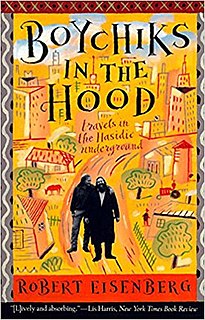
Boychiks in the Hood is a 1995 memoir by Robert Eisenberg that chronicles Eisenberg's travels around the world visiting different Hasidic communities. Einsenberg wrote the memoir as a way to explore communities where Yiddish was the first language spoken among all generations. It is widely recognized as a reputable source for information on Hasidic life.
Anabaptists and Jews have had interactions for several centuries, since the origins of Anabaptism in the Radical Reformation in early modern Europe. Due to the insularity of many Anabaptist and Jewish communities, Anabaptist–Jewish relations have historically been limited but there are notable examples of interactions between Anabaptists and Jews. Due to some similarities in dress, culture, and language, Amish and Mennonite communities in particular have often been compared and contrasted to Hasidic Jewish communities.
